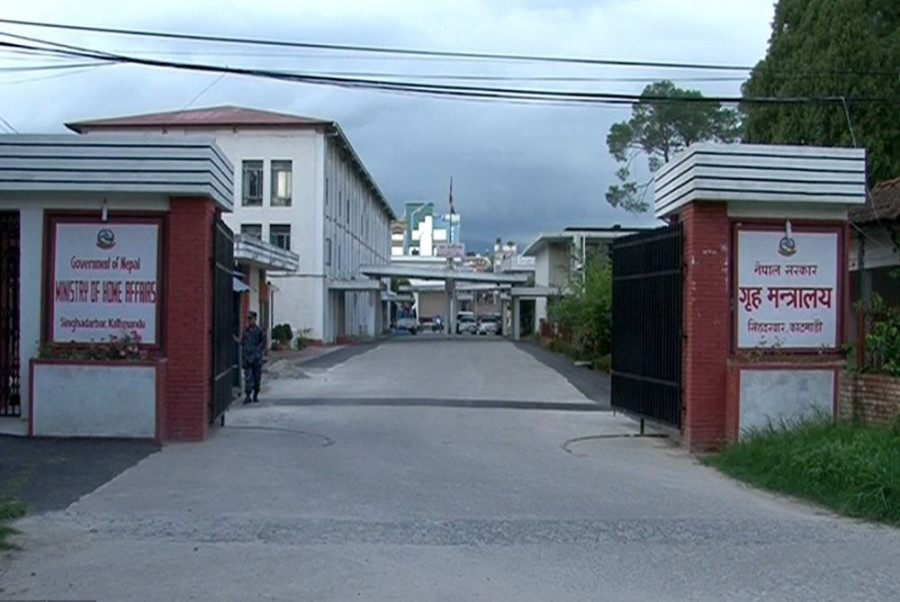National
Non-government organisations concerned over a new law to regulate them
The move to authorise Home Ministry to draft the law could be part of the bid to introduce stringent provisions, groupings of social organisations say.
Prithvi Man Shrestha
A Cabinet decision to authorise the Ministry of Home Affairs to prepare a draft of a new law to regulate and supervise social organisations has raised serious concerns among the non-governmental organisations who allege that the move is against the government’s own Work Division Regulations.
As per the government’s Work Division Regulation, the Ministry of Women, Children and Senior Citizens is the designated agency to draft policies, laws, standards and regulations for non-government organisations.
About a month ago, the Ministry of Women Children and Senior Citizens had sought Cabinet approval to draft regulations for non-government and social organisations.
“But the Cabinet rejected our proposal, arguing that approval has already been given to the Home Ministry to draft a new law regarding non-government organisations,” said Rajendra Kumar Poudel, joint-secretary at the ministry.
Earlier, both ministries were working independently on draft laws on social organisations, but the Home Ministry got the Cabinet approval, first.
Home Ministry Spokesperson Kedar Nath Sharma admitted that the ministry had prepared a draft of the law. “But I am unaware of the content; I was appointed here only recently,” Sharma told the Post.
Officials from the local and foreign non-government organisations said the Home Ministry never consulted them regarding the law that it had been drafting.
“We are concerned if the ministry is focusing on controlling non-government organisations, instead of regulating and facilitating them,” said Jitbir Lama, president of NGO Federation Nepal, a grouping of local NGOs.
Their fear also stems from the government’s efforts last year targeting the NGO sector.
The government’s National Integrity Policy 2018 had courted controversy for it aimed tighter controls over non-government space. The proposed policy has provisions that the International Non-Government Organisations (INGOs) need to take approval from the Finance Ministry for their annual programmes, including funding. It also barred INGOs from sending reports about Nepal to countries where their headquarters are, without taking the government’s permission.
As well as its wide-ranging recommendations for political parties, the diplomatic community, constitutional bodies, professors, teachers and the private sector were also matters of concern. While prima facie, the policy’s aim was touted to be an effort to ensure good governance, critics were of the view that the country already had laws and institutions for ensuring good governance, accountability and transparency.
“With the new move of authorising the Home Ministry to formulate a law regarding the non-governmental space, we are concerned if the government is trying to adopt even more controlling measures,” said Achyut Luitel, chairperson of the Association of International NGOs in Nepal, an informal network of INGOs working in Nepal.
“The government intends to control INGOs that work in the areas of political and human rights and encourage them to invest in the infrastructure sector,” Luitel added. He laid emphasis on the need for social organisations that work in the areas of political and human rights.
The government, however, has been employing Associations Registration Act-1977 to make non-government organisations register with District Administration Offices, which work directly under the Home Ministry.
On June 14 last year, the Home Ministry had issued a circular to District Administration Offices and Social Welfare Council, asking them to seek property details of office bearers and staff of NGOs and INGOs while registering, renewing or affiliating them. Likewise, the ministry had told the District Administration Offices to allow NGOs to carry out their activities only in a particular field, requiring them to amend their statutes and choose only one particular sector. As per the circular, NGOs and INGOs were required to submit financial and progress reports outlining their activities, including financial details, every four months.
The ministry, however, backtracked after strong protests and lobbying from NGOs and INGOs.
“This is one of the reasons why we are concerned with Home Ministry drafting the law on NGOs and INGOs,” said Lama.
Non-government organisations, however, continue to face hurdles during registration and renewal, according to Lama.
“In order to renew an NGO’s licence, District Administration Offices seek various documents including recommendations from various ministries and the local government where the NGO is located,” said Lama. “Some problems existed in the past, too. But the situation has deteriorated ever since the current government was formed.”
Home Ministry officials admit that NGOs and INGOs’ fears are natural, given the history of past incidents.
“Their source of fear could be last year’s circular,” said Sharma, the ministry spokesperson. “But a law-making process is different. The draft needs to be approved by the Cabinet and Parliament debates the bill. If there are any concerns, they could be addressed before it becomes a law.”
NGOs and INGOs say the easy way to dispel concerns is wider consultation among the stakeholders during the drafting phase.
A senior official at the Ministry of Women, Children and Senior Citizens said that the Home Ministry wants to employ District Administration Offices, which work directly under the Home Ministry, in supervising and tracking non-government institutions.
Those working in the field of civil liberty, freedom of expression and press freedom say the problem with the government and its agencies is the intent given that some controversial bills and decisions that aimed to curtail civil liberties.
Taranath Dahal, executive chief of Freedom Forum, which works in areas of democracy, human rights and press freedom, said what’s more important is what provisions the law has, instead of who is drafting it.
“The new law should ensure freedom of associations of people,” said Dahal.




 13.12°C Kathmandu
13.12°C Kathmandu














